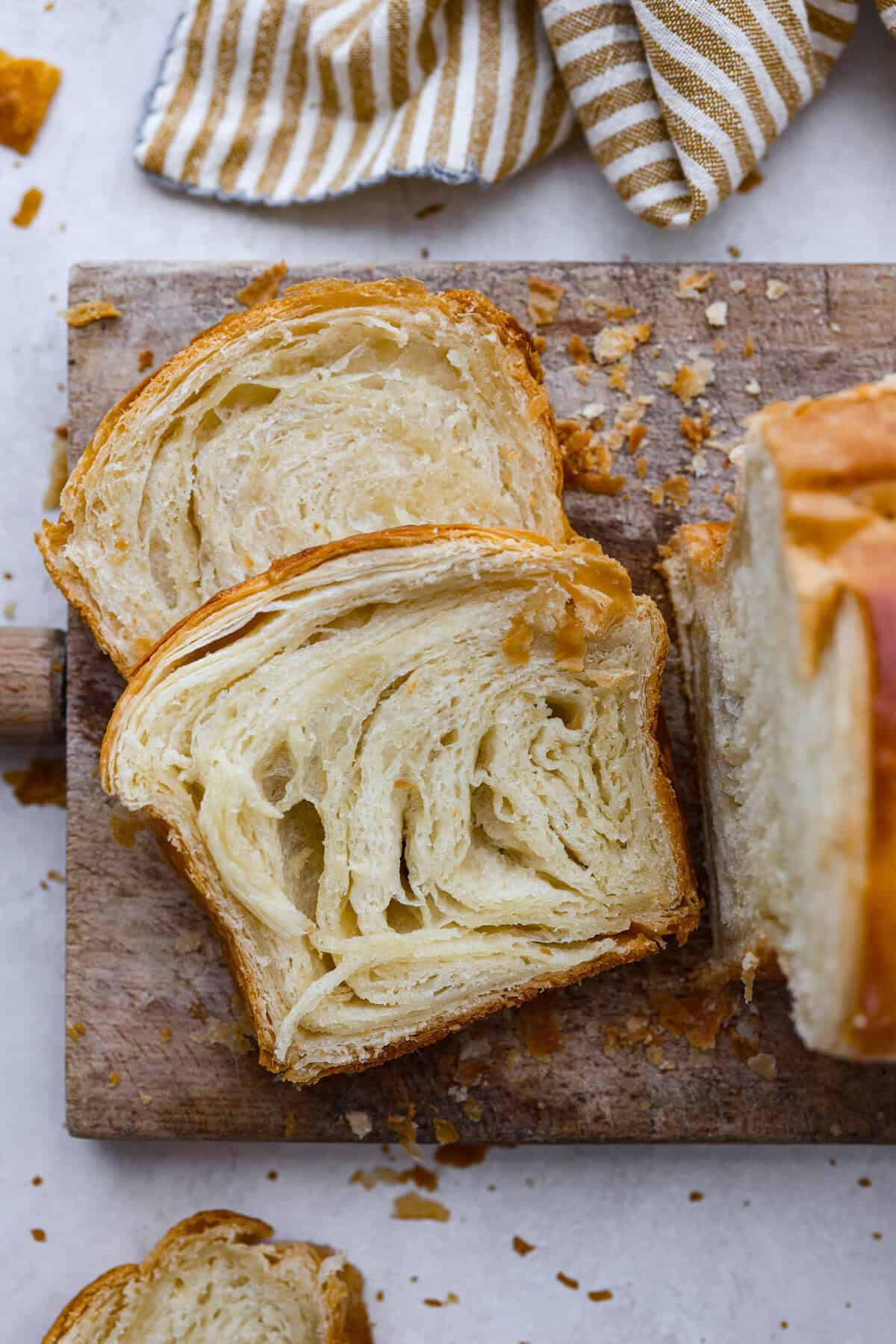This website may contain affiliate links and advertising so that we can provide recipes to you. Read my disclosure policy.
Croissant Bread is beautiful and fluffy with crispy, flaky layers on the outside. It’s also one of the most delicious breads you’ll ever taste – it will be love at first bite! Add it to your next brunch spread and use it to make French toast, sandwiches, and breakfast casseroles!
Homemade bread is one of my favorite things to bake! I used to be intimated to make yeast bread but it’s actually not bad at all! Check out my beginner’s guide to baking bread, if you’re just getting started. And this simple no-knead bread or my grandma’s perfect homemade bread are great recipes for any beginner!
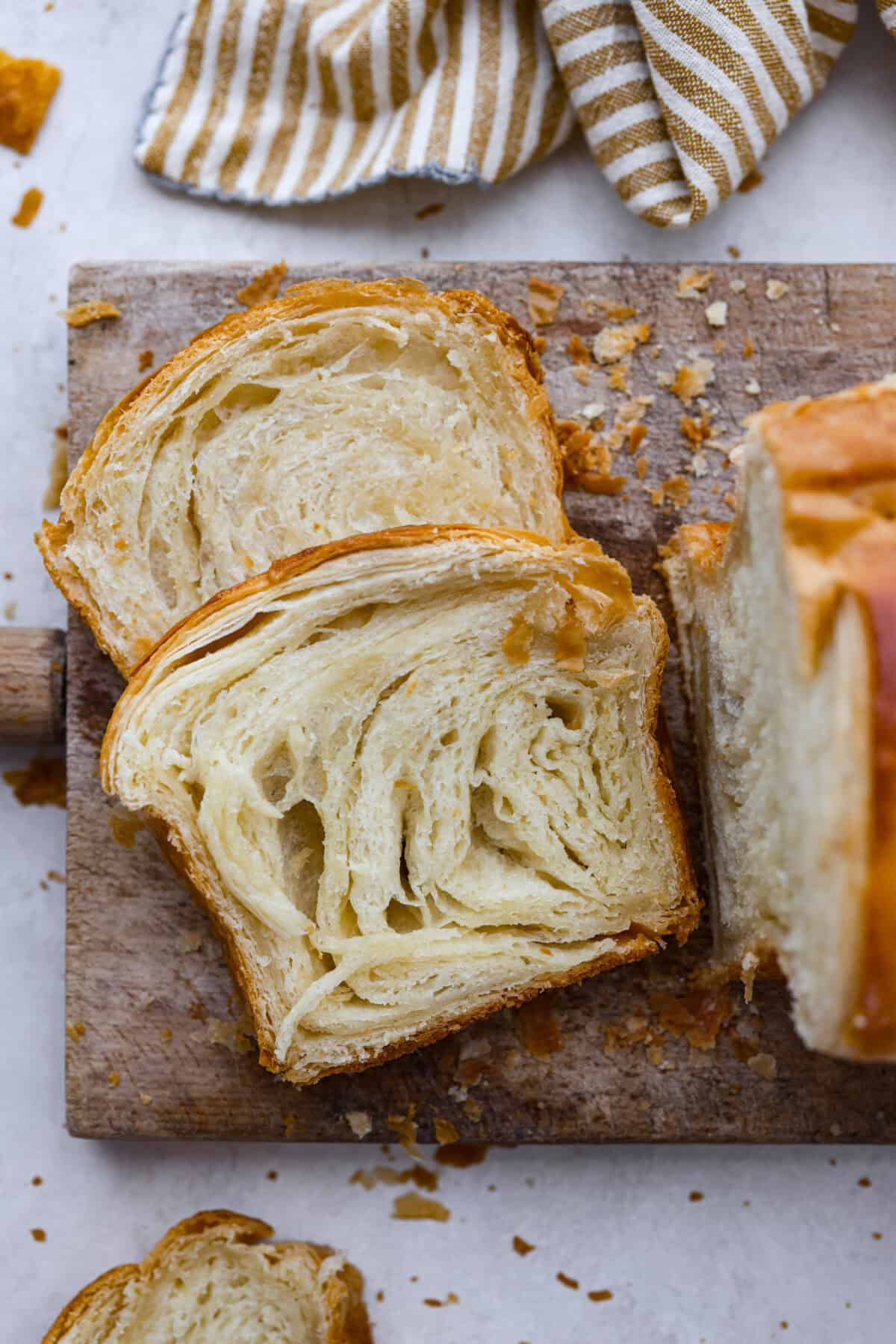

Reasons You’ll Love This Recipe
- Incredible Taste and Texture: Croissant bread smells and tastes like a croissant but slices like sandwich bread.
- Step-by-Step Instructions: This guided post will set you up for success in making this delicious pastry bread! I walk you through all the steps and share my best tips.
What is Croissant Bread?
Get ready to be blown away by this irresistibly delicious croissant bread! It’s made with a simple croissant dough baked in a loaf pan. The taste and texture are just like something you would find in a French bakery. One bite and you will be obsessed with the layers of butter and the hint of sweetness. The inside is melt-in-your-mouth soft and fluffy, with a crispy, flaky crust.
As an added plus, it’s super versatile! It’s wonderful on its own or toasted and smeared with cinnamon butter or jam, but it also cooks up fabulously as a grilled cheese, in bread pudding, or used to make a BLT sandwich! No matter how you enjoy it, you’re sure to love it so much!
Ingredients You’ll Need
This croissant bread uses adding honey for sweetness and plenty of butter for laminating the dough. Laminating dough (or folding in butter) will help create the many layers of airy flakiness. Check out the recipe card at the bottom of the post for all of the exact measurements.
- Milk: For extra richness, this recipe uses milk instead of water to activate the yeast.
- Yeast: 1 packet of active dry yeast is enough for one loaf of this bread.
- Honey: Adds just enough sweetness.
- Butter: For buttery flavor.
- Flour: All-purpose flour will work the best for maximum tenderness.
- Salt: To bring out all of the flavors.
- Butter: Cold butter is folded into the dough during the lamination process. When it bakes, the butter melts, resulting in warm, delicious buttery layers.
- Egg and Milk: We mix one large egg and a small amount of milk together to create an egg wash, which is brushed over the loaf to give it a golden brown sheen.
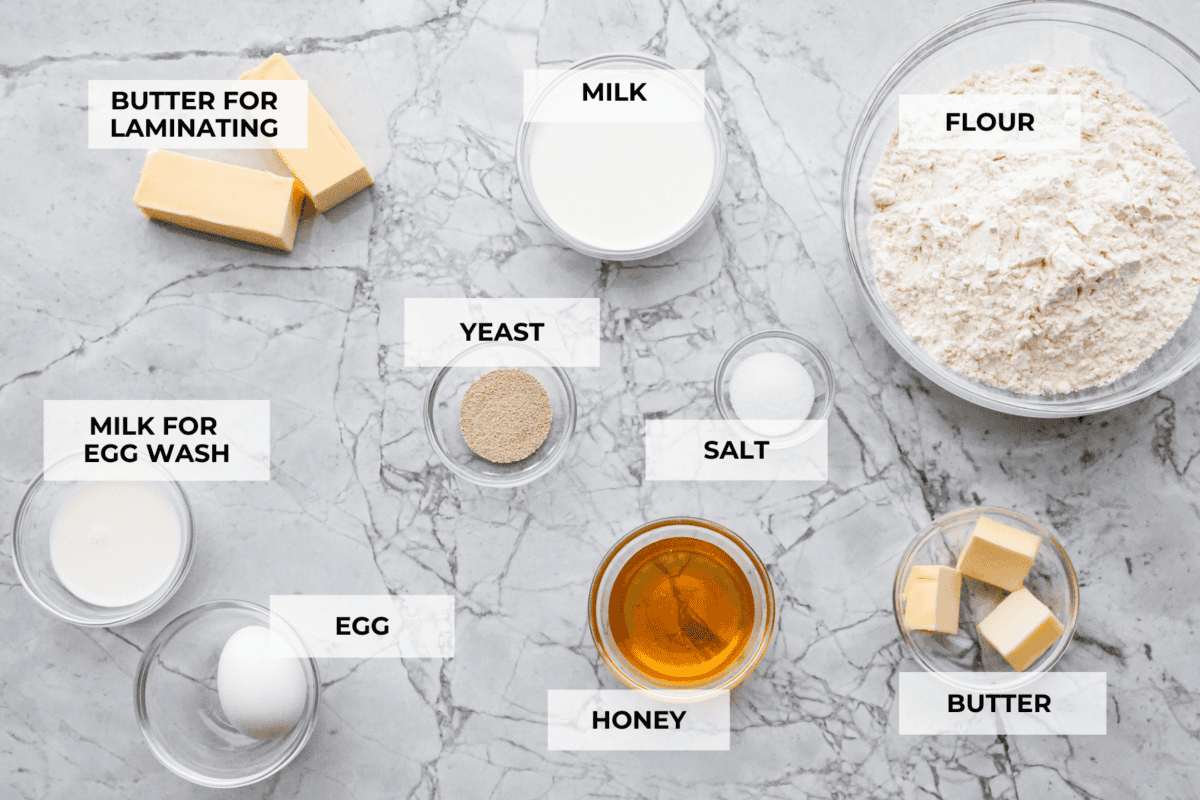

How to Make Croissant Bread
There are quite a few steps for making homemade croissant bread, but they’re all really easy and so worth it. Scroll through to learn how to make the best homemade bread!
Make, Rise, and Chill the Dough
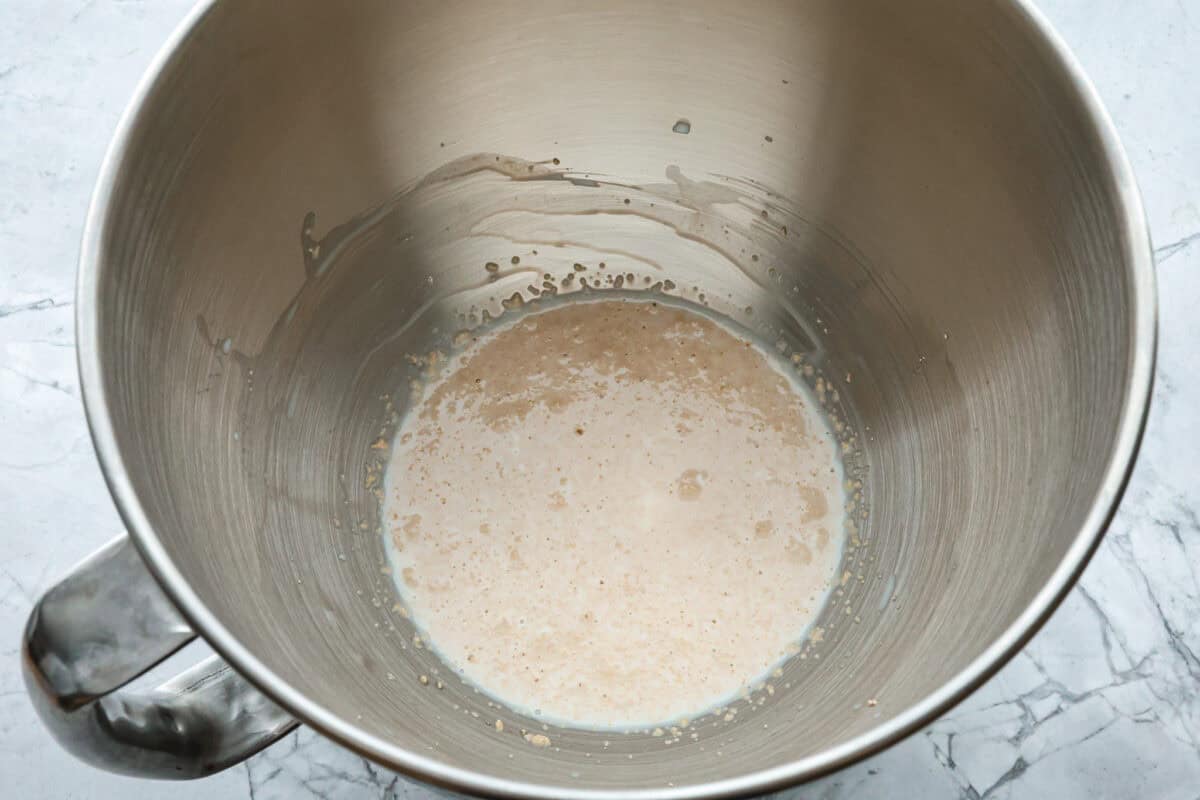

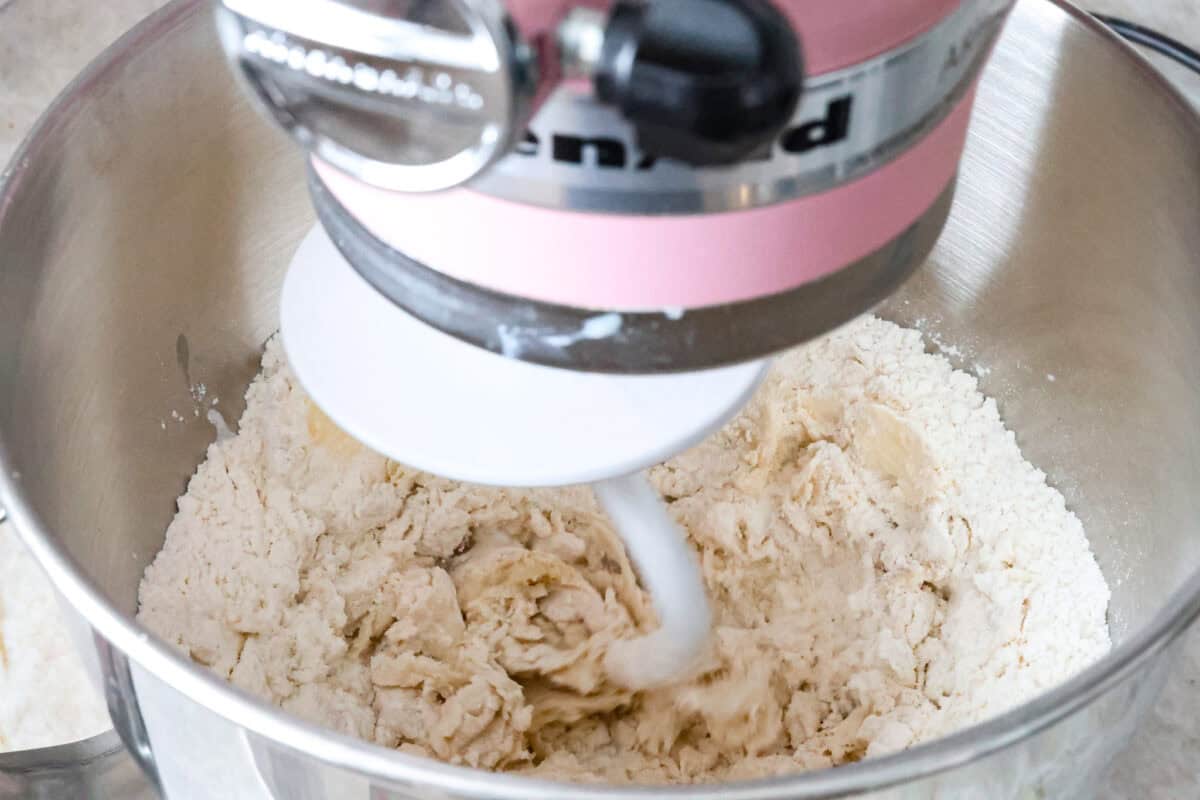

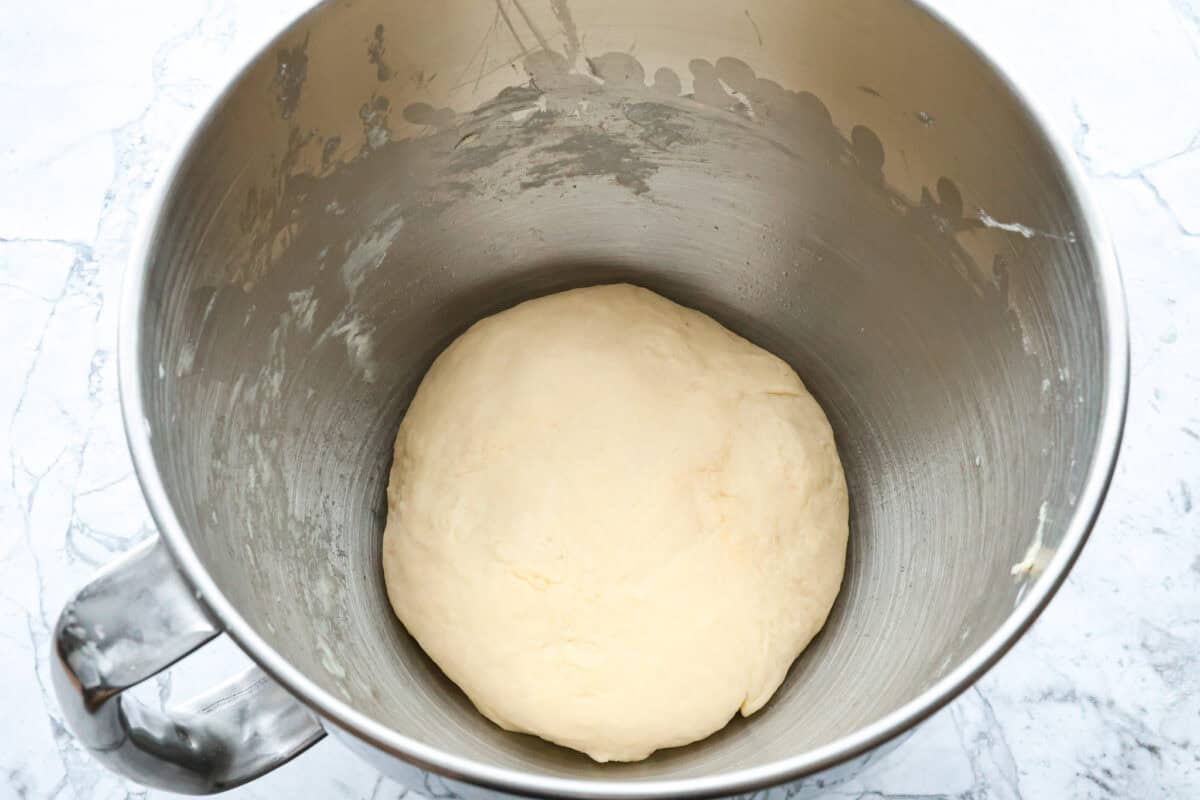

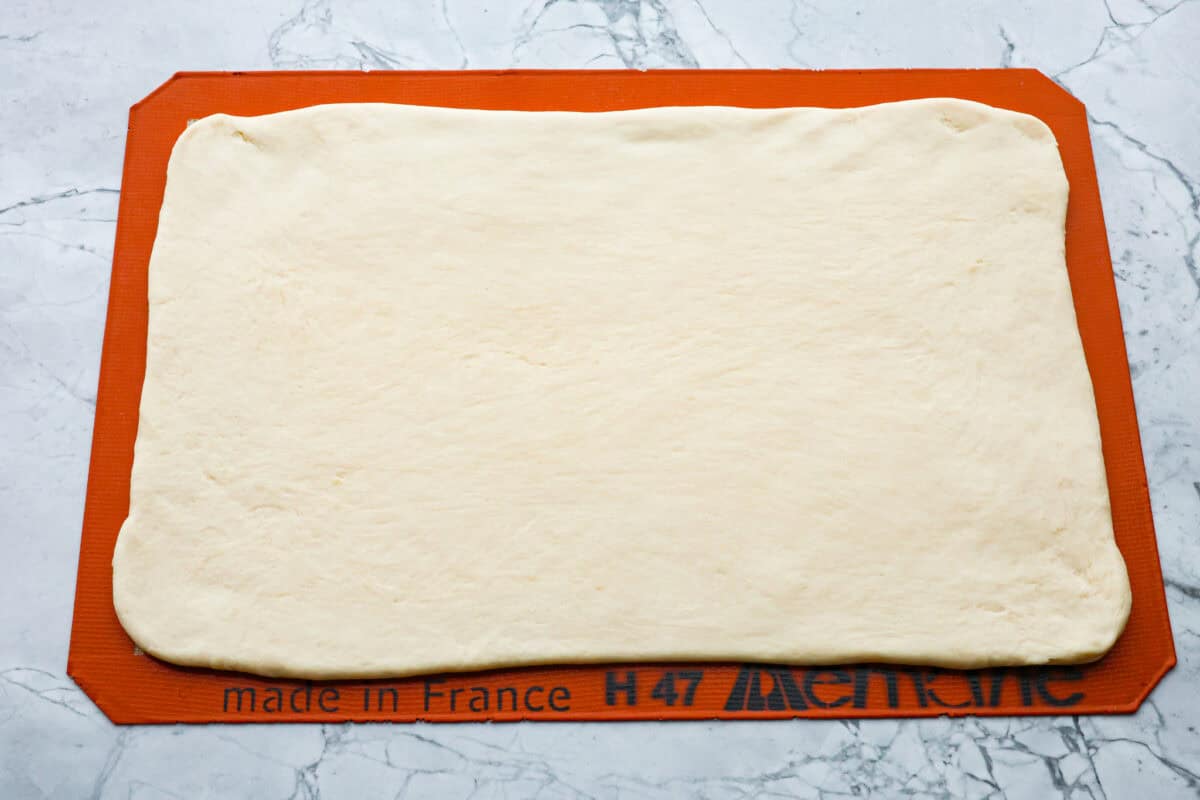

- Proof the Yeast: Add the milk, instant yeast, and honey to the bowl of a stand mixer. Whisk together and cover for 5 minutes. The mixture should foam up.
- Mix in Butter, Flour, and Salt: Add the softened butter, 2 cups of flour, and salt. Using the dough hook attachment, mix the ingredients at low speed. Add in additional flour if needed. The dough should pull away from the bowl of the mixer but not be too dry. Knead the dough for 5 minutes in the mixer on medium speed or on a lightly floured surface using your hands.
- Rise the Dough: Add the dough to a lightly oiled bowl and cover it. Let the dough rest at room temperature for about an hour. The dough should double in size.
- Chill the Dough: Line a baking sheet with parchment paper or a silicone baking mat. Once the dough has risen, dump it out onto the lined baking sheet and pound it flat with your hand or a rolling pin into a 9×14-inch rectangle. Cover the dough and place it in the fridge for 20 minutes. Once the dough has chilled, remove it from the fridge.
Laminating the Dough
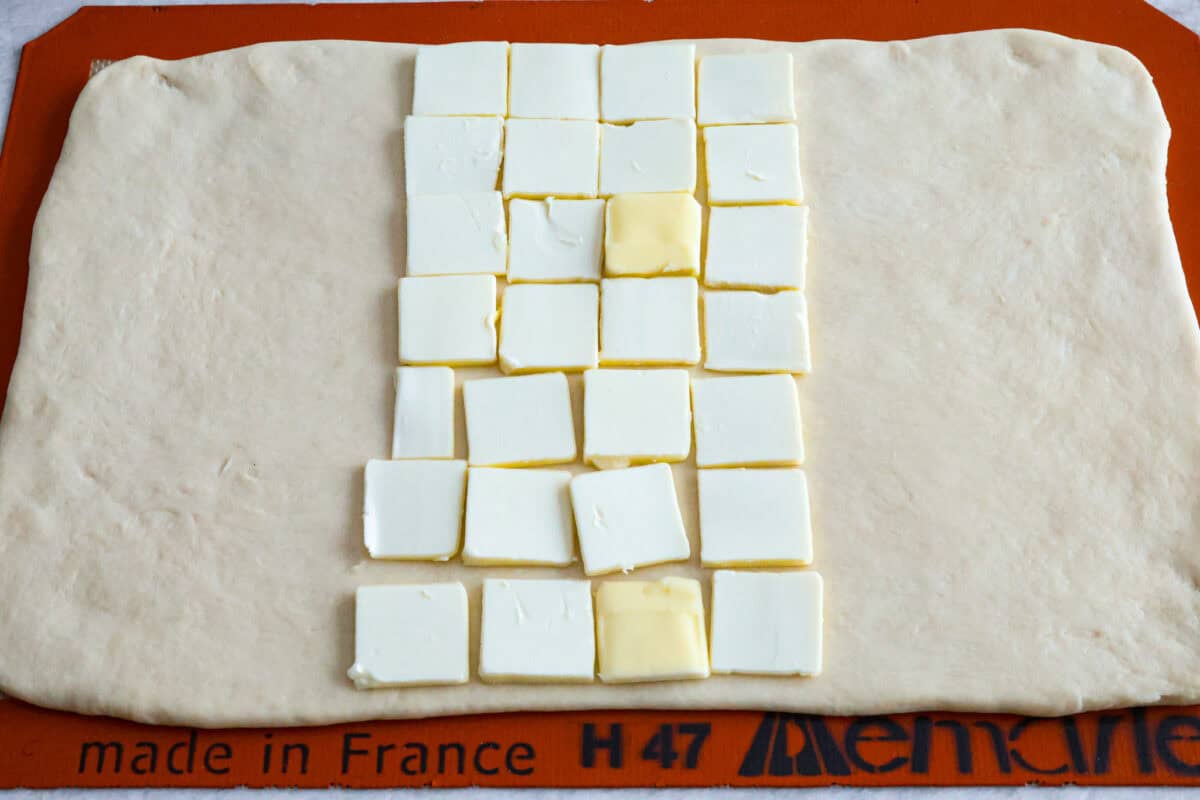

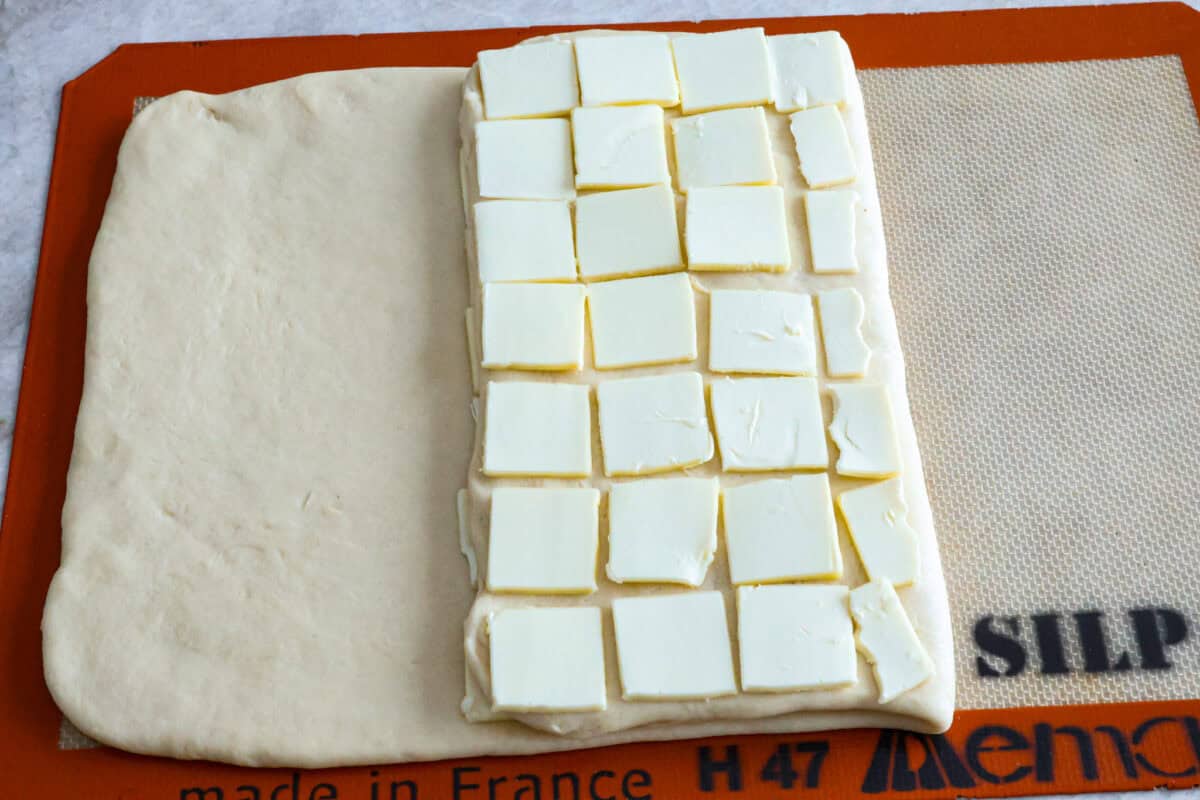

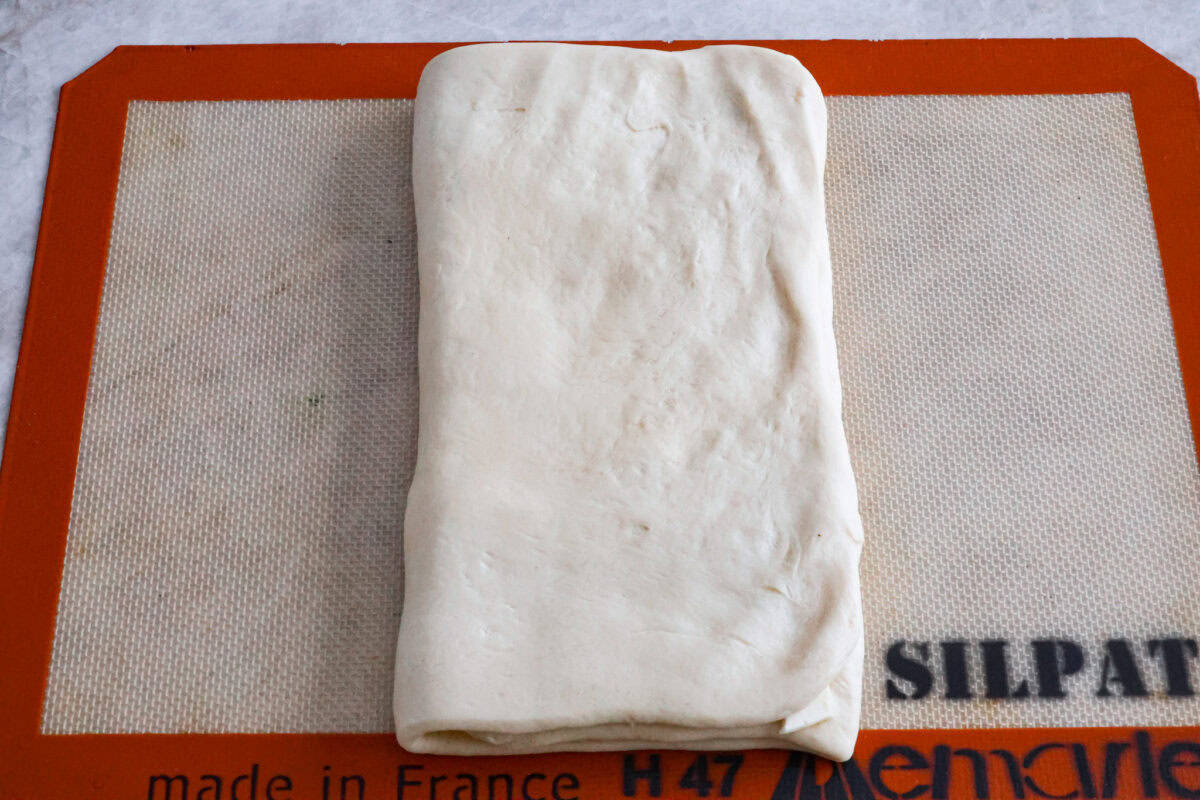

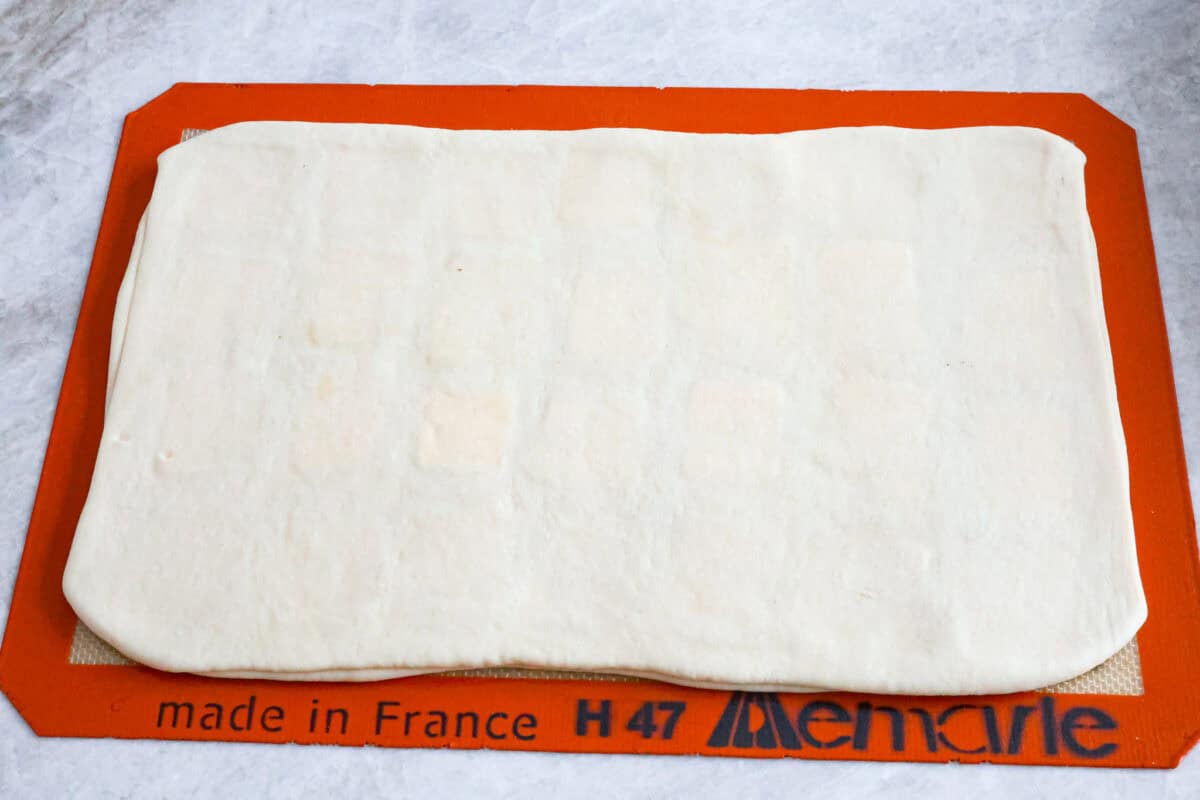

- Arrange the Pads of Butter: Slice the slightly softened butter into ⅛ inch-thick slices, then lay half of the slices in the center ⅓ of the slab of dough,
- Fold One Side and Layer on the Remaining Butter: Fold one side of the center of the slab on top of the butter. Lay the other half of the butter slices on top of the dough and fold over the other side.
- Roll and Fold: Roll this slab out into another 9×14-inch rectangle. Fold it again one side over the center and the remaining side on top of that, like a letter fold.
- Roll Out the Dough and Chill: Roll it into another 9×14-inch slab, place it back on the pan, cover it, and refrigerate for another 20 minutes.
Shape and Raise the Croissant Bread Dough
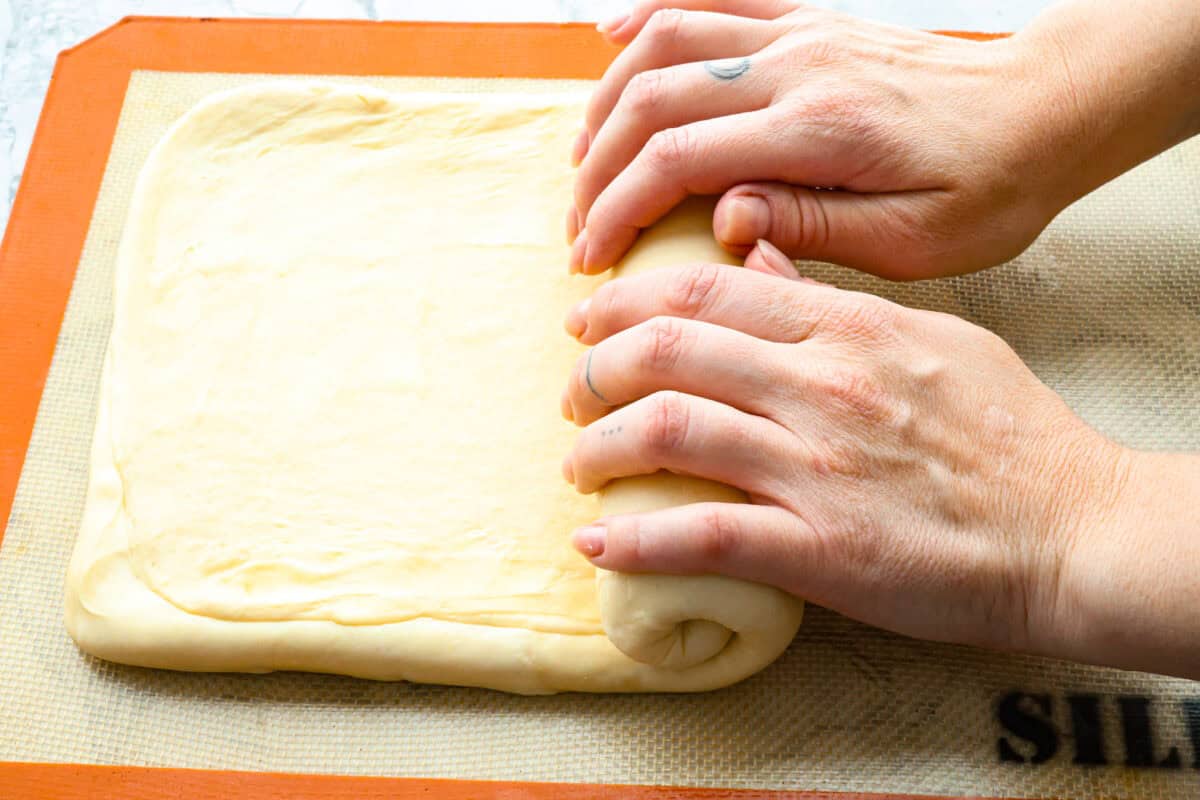

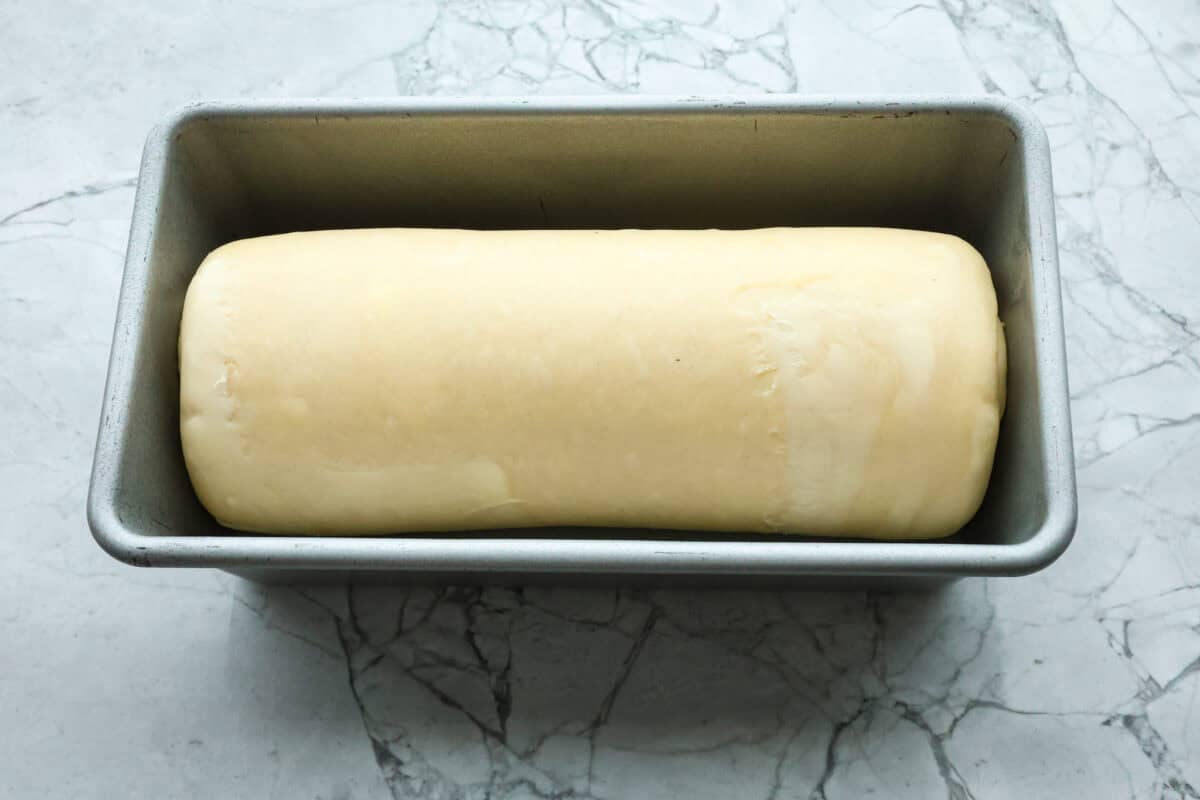

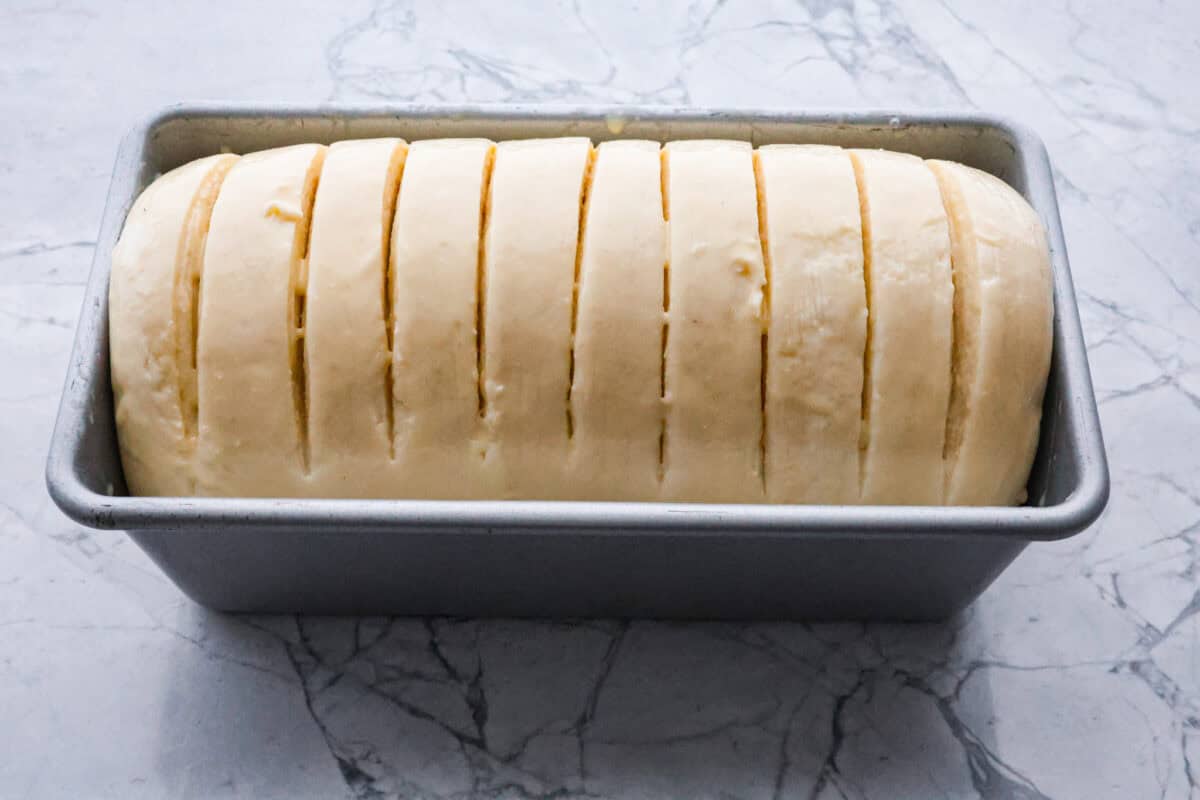

- Roll Into a Log Shape: Working from the short side, roll the dough into a log about 9 inches in length.
- Cover and Raise the Loaf: Spray a loaf pan with non-stick cooking spray and place the loaf into the pan. Cover the loaf and let it rest at room temperature to rise. While the loaf is rising, preheat an oven to 375 degrees Fahrenheit.
- Score and Bake: Once the loaf raises, score it horizontally a few times with a knife. Make the egg wash and brush it on the top of the loaf. Bake the loaf for 10 minutes, uncovered. Lightly place foil over the top to keep it from getting too dark. Continue baking for 20 minutes until the crust is golden brown. The inside temperature should be 190 degrees Fahrenheit. Take the loaf out of the oven and let it rest in the pan for at least 10 minutes, then remove it from the pan to finish cooling.
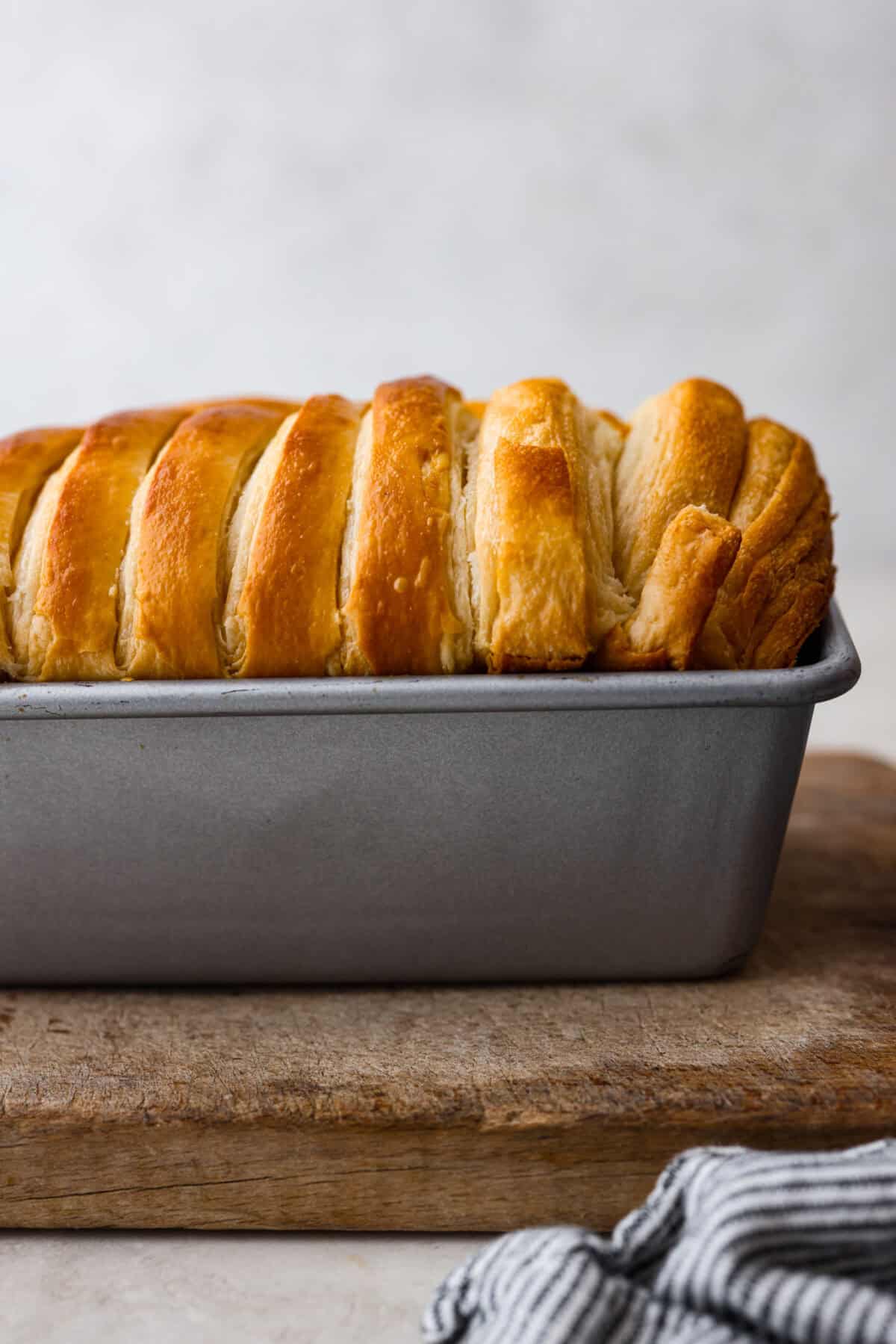

Tips for Perfect Croissant Bread
Simply follow all of the steps, and you’ll see that making croissant bread is actually pretty easy. Here are some tips so it turns out perfect!
- Butter Temperature: The butter for lamination should be soft enough to cut easily but not soft enough to spread. If the butter becomes too soft, spread it instead of placing the pats of butter, fold up the dough into the tri-fold like normal then pop it in the fridge for 20 minutes to harden the butter a bit before rolling out.
- If the Dough is Sticky: If the dough is getting sticky while you knead it you can add a dusting of flour, but don’t add too much and dry the dough out.
- Temperature of the Dough Make sure the dough is cold but not too hard to roll out. Twenty minutes may not be enough time to cool it down, but if it is too cold or hard to roll out, cover it and let it sit at room temperature for a few minutes until it is just soft enough to roll out.
- Using Foil to Bake: Watch the crust’s color; once you take the foil off, it will brown pretty quickly. Check the internal temperature for doneness, and if it’s still not the right temperature but the color is getting dark, place the foil back on top while it finishes baking.
- Added Flavors: One of my favorite things I had in Paris was their chocolate croissants. When you are doing the lamination process, maybe add some chocolate, raisins, or a cinnamon sugar mixture to your layers!
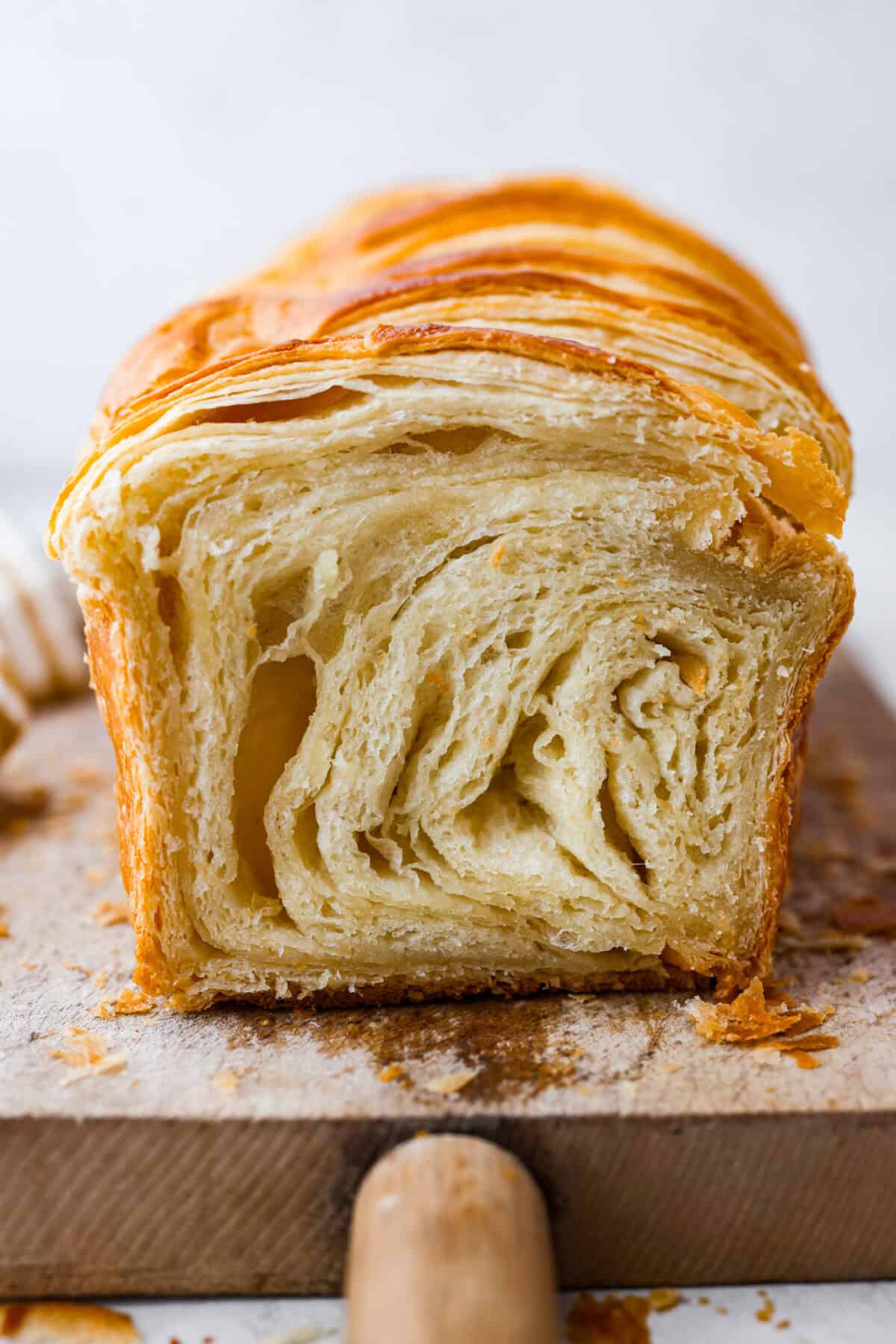

Storing Leftover Croissant Bread
Before storing your bread, make sure that it has cooled completely; otherwise, the loaf will sweat and become soggy.
- Refrigerate: Store your loaf in the fridge to make it last longer! Once you place it in an airtight container and put it in your fridge, it will last for about 7 days.
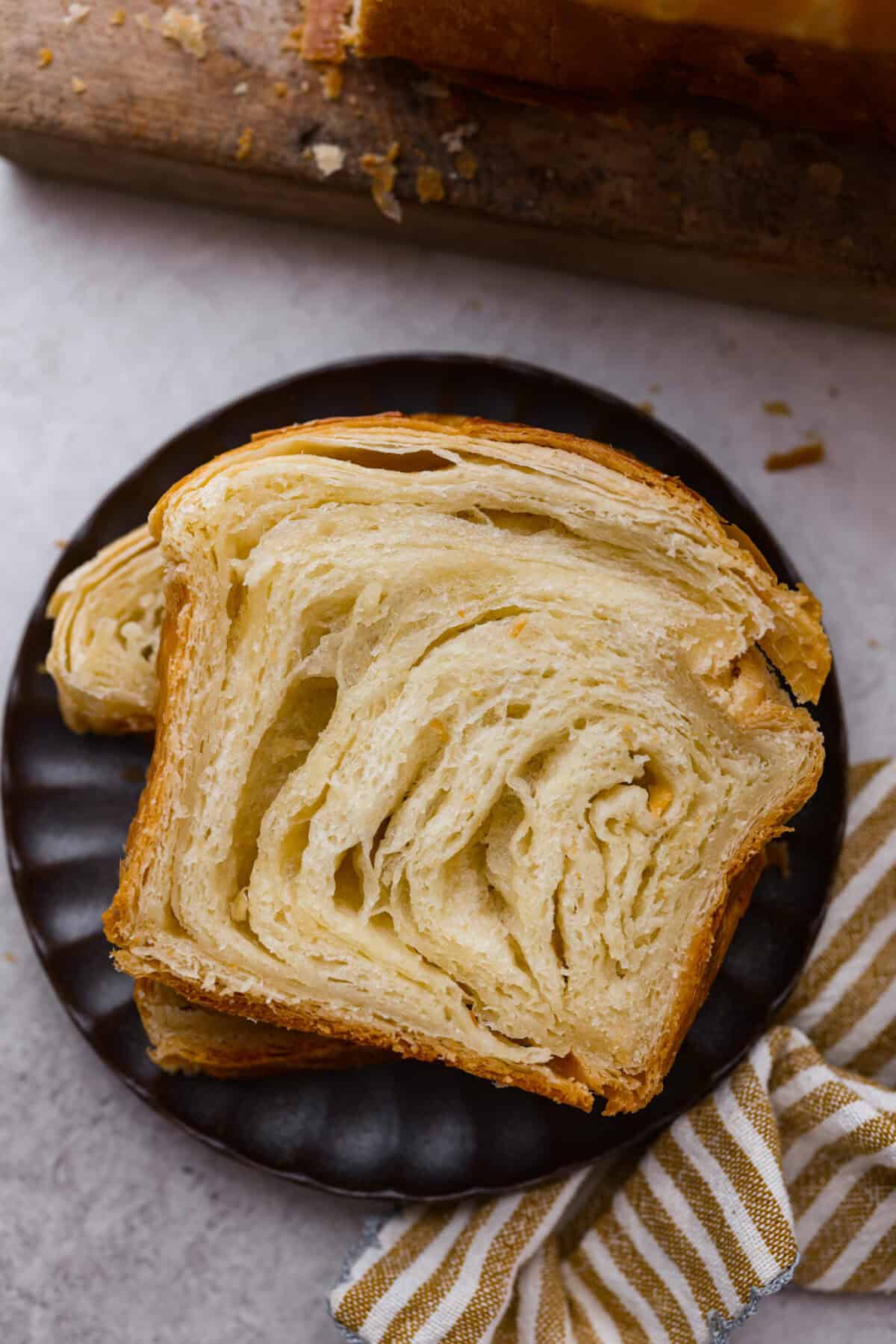

More Bread Recipes You’ll Love
If this incredible croissant bread has given you inspiration to make more bread, check out the recipes below!
Pin this now to find it later
Make the Dough
-
Add the milk, yeast, and honey, to the bowl of a stand mixer. Whisk together and cover for 5 minutes. The mixture should foam up.
-
To the same bowl, add the softened butter, 2 cups of flour, and salt. Using the dough hook attachment, mix the ingredients until they begin to come together. Scrape the sides of the bowl to incorporate all the ingredients.
-
Add additional flour, if needed, two tablespoons at a time, until a soft dough forms, scraping the sides of the bowl as needed. The dough should pull away from the bowl of the mixer but not be too dry.
-
Once the dough has formed, knead it for 5 minutes in the mixer on medium speed or on a lightly floured surface with your hands.
Rest and Chill the Dough
-
Add the dough to a lightly oiled bowl and cover it. Let the dough rest at room temperature for about an hour. The dough should double in size.
-
Line a baking sheet with parchment paper or a silicone baking mat. Once the dough has risen, dump it onto the lined baking sheet and pound it flat into a 9×14-inch rectangle.
-
Cover the dough and place it in the fridge for 20 minutes. Once the dough has chilled, remove it from the fridge.
Laminate the Dough
-
For the first step of laminating the dough, slice the slightly softened butter into ⅛ inch-thick slices.
-
Lay half of the slices in the center ⅓ of the slab of dough, and fold one side of the center of the slab on top of the butter.
-
Lay the other half of the butter slices on top of the dough and fold the other side on top of that. You should have a butter, dough, butter layering pattern where the outside of the slab is all dough with no exposed butter.
-
Roll this slab out into another 9×14-inch rectangle. Fold it again one side over the center and the remaining side on top of that, like a letter fold. Roll it into another 9×14 inch slab, place it back on the pan, cover and place it back in the fridge for another 20 minutes.
-
After 20 minutes, take the dough out and off the pan, do a tri-letter fold on it again, and roll it back into a 9×14-inch slab. Do the tri-fold one more time and roll it back into a 9×14-inch slab.
Shape and Rise the Dough
-
Now, working from the short side, roll the dough into a log about 9 inches in length.
-
Spray a loaf pan with non-stick cooking spray and place the loaf into the pan. Cover the loaf and let it rest at room temperature to rise. While the loaf is rising, preheat an oven to 375 degrees Fahrenheit.
Score and Bake
-
When the loaf has risen to just above the height of the pan, score it horizontally a few times with a knife. Make the egg wash by whisking together the egg and milk, and brush the egg wash on the top of the loaf.
-
Bake the loaf for 10 minutes, uncovered. Lightly place foil over the top to keep it from getting too dark. Continue baking for 20 minutes until the crust is golden brown and the internal temprature reaches 190 degrees Fahrenheit.
-
Take the loaf out of the oven and let it rest in the pan for at least 10 minutes, then remove it from the pan to finish cooling.
Serving: 8slicesCalories: 2718kcalCarbohydrates: 256gProtein: 43gFat: 172gSaturated Fat: 106gPolyunsaturated Fat: 8gMonounsaturated Fat: 44gTrans Fat: 6gCholesterol: 612mgSodium: 4906mgPotassium: 829mgFiber: 7gSugar: 66gVitamin A: 5513IUVitamin C: 0.3mgCalcium: 452mgIron: 13mg
Nutrition information is automatically calculated, so should only be used as an approximation.


